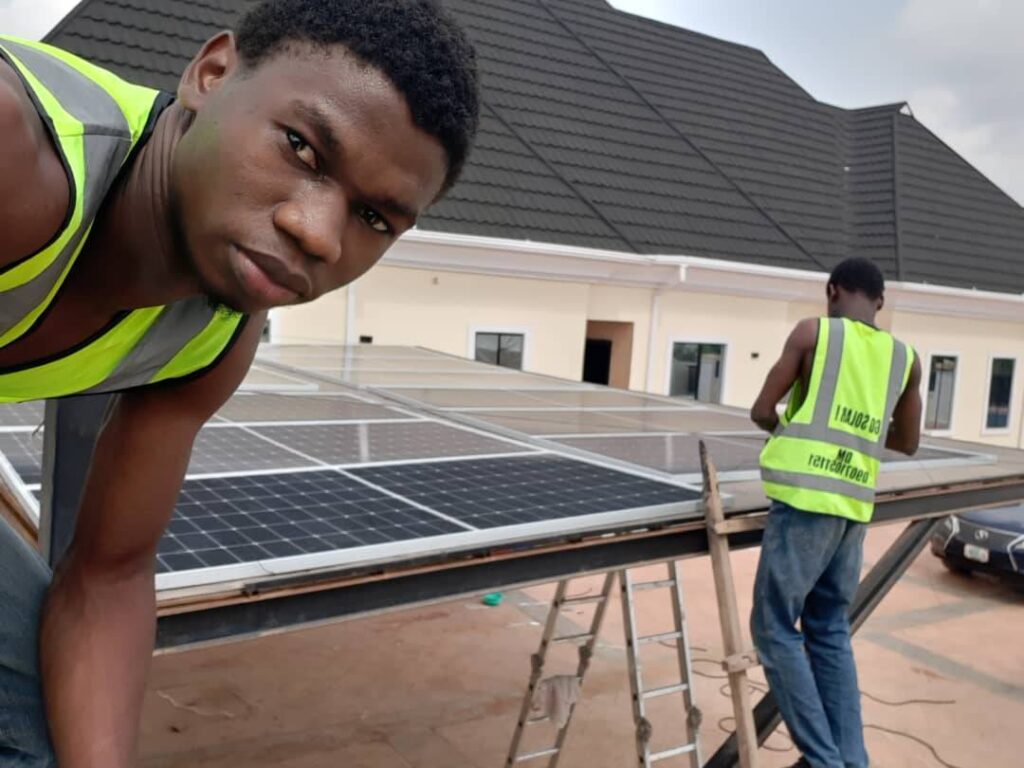When determination meets opportunity, the obvious result is always success, and that’s exactly what the Isiaka twins represent; two boys who refused to let their poor background keep them in poverty are fast making a name for themselves in the Nigerian electricity conversation.
The 22-year-old 200L students of Electrical Electronics students at the prestigious university of Ibadan are out to ensure that Nigerians enjoy at least 20 hours of electricity daily by switching to solar energy.
During an exclusive interview with Battabox.com, the twins narrated how they had to hold a tough conversation with themselves on what to do next and how they could begin to fend for themselves.
READ ALSO: Go solar: How Nigerian twins are helping citizens enjoy 24hrs electricity
Kehinde told Asukwo Oduo that he prayed and fasted alongside his brother, asking God for direction, and they were about to clock 21, and responsibility was setting in.
He said they used their last card for a birthday photoshoot wearing their engineering overall. Meanwhile, they were already self-learning solar installations and selling electronics online.
However, their breakthrough came a few days after their birthday, in August 2021, when they got their first contract to install solar for a client; after doing a great job, they shared pictures on WhatsApp, and a week later, another client came calling after seeing the photos they shared on social media.
“We started with integrity; once you have integrity and people can trust you, you don’t need start capital,” Kehinde said.
Challenges involved in solar installation

Taiwo mentioned that one of the major challenges they have faced in the business is payment. He said some clients don’t want to trust people they don’t know, so one of them has to meet the client to convince them.
READ ALSO: Creative Nigerian student spends N1.2m, builds light truck as final year project
He added that technical problem is another barrier they face because sometimes suppliers can sell fake equipment to them without their knowledge.
“Challenges will surely come and they are normal things in life. I remember when one client threatened us with soldiers because of a faulty charge controller we bought; we tested it at the market, and it was working properly; it was after installation we discovered we had bought a fake one. However, we rectified it, and that man is one of our favourite client today, who later upgraded his Solar system from 1KVA to 2.5KVA. Meanwhile, we have commissioned over 57 projects, and none of such has happened ever again; as the saying goes, once bitten, twice shy,” Taiwo said.
On his part, Kehinde added that logistics was another problem they battle within the business. Sourcing for drivers to convey them to the installation site could be difficult as they had to call several drivers before finally finding one. However, plans are underway to get a logistic bus that will mitigate this challenge.
Combining academics with business
When our correspondent asked how they combine academics and running such a big business, the twins said some clients can’t wait, and school activities can’t wait also; sometimes classes could clash with a contract they have, and when this happens, they assign their team members to execute.
On managing money and relationships with girls
The twins run a business outfit called The Trills Consulting and have successfully completed over 57 solar installation projects across Nigeria and received huge recommendations for doing an amazing job.
READ ALSO: Talented Nigerian boy builds high-flying drone using locally-sourced items
On relationships, the twins said they are focused on other areas of their lives at the moment, developing themselves and striving to attain greater feats in life.
“We call ourselves modern monks to make girls stay away from us. We’re not in any relationship,” they said.
They revealed that they manage their money properly and are investing in other green energy projects, one of which is near completion. They are also supporting their parents and sponsoring themselves through school.
